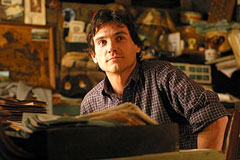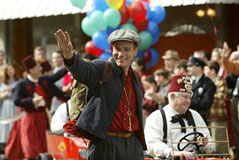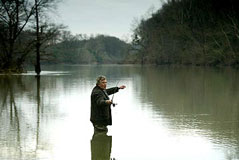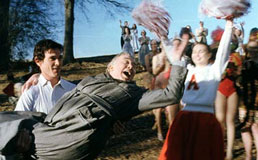Big Fish (Tim Burton, 2003)
 With a stellar cast, a plum December
release date, and the exciting promised oxymoron of a mature Tim Burton film, it
would be tough for any cinephile to not eagerly anticipate the arrival of Big
Fish. Unfortunately, the results make its prerelease promise feel more like
the one that got away. If Big Fish is
to be taken as a deliberate stab at escaping his image as a wunderkind, it
disappoints. Maturity to Burton seems to mean having to make excuses for his
flights of fancy instead of the expected opposite. My idea of a mature Burton
film would consist of an undiluted, unapologetic stream of his creations instead
of a toned down, overly coy procession wrapped up in a mawkish family drama
that’s meant to justify the tall tales we hear.
With a stellar cast, a plum December
release date, and the exciting promised oxymoron of a mature Tim Burton film, it
would be tough for any cinephile to not eagerly anticipate the arrival of Big
Fish. Unfortunately, the results make its prerelease promise feel more like
the one that got away. If Big Fish is
to be taken as a deliberate stab at escaping his image as a wunderkind, it
disappoints. Maturity to Burton seems to mean having to make excuses for his
flights of fancy instead of the expected opposite. My idea of a mature Burton
film would consist of an undiluted, unapologetic stream of his creations instead
of a toned down, overly coy procession wrapped up in a mawkish family drama
that’s meant to justify the tall tales we hear.
 From the its opening, which presents a
quirky fishing story and clunky expositional narration courtesy of the
storyteller’s son, Big Fish moves
along a predictable emotional trajectory. In it, Will Bloom (Billy Crudup), the
estranged offspring of ailing father Edward, attempts to cut through the web of
exaggerated lies his father has told him over the years and learn who he really
was. A compulsive storyteller and frequent fabricator, Edward has alienated his
son and continues to stymie his attempts to connect as he lays on what appears
to be his death bed. As the film proceeds, it spends most of its running time in
flashback, relaying the embellished story of Edward’s growth as a man.
Unfortunately, Burton is so taken with Edward’s tales that the son’s efforts
to find the man who lives behind the façade come off like the machinations of a
sulking child. The father gives no justification for his actions, and the movie
doesn’t ever really suggest he needs any. It’s easy to see the movie as the
adamant defense of a storyteller, but it’s just as easy to see a blind spot in
that logic. Self-absorption is not inherently unacceptable, but that doesn’t
mean that it doesn’t sometimes take its toll. Big
Fish is so uninterested in the real world that Jessica Lange, as Edward’s
frequently abandoned wife, has next to no role to play. If she feels anything
other than sheer gratefulness for Edward, it’s not apparent. Worst of all,
there’s no explanation beyond a mundane desire for greatness for Edward’s
partial retreat into his fantasy world, which allows the viewer to better
sympathize with Will, but leaves his father as a sketchily developed figure,
even after the film ends.
From the its opening, which presents a
quirky fishing story and clunky expositional narration courtesy of the
storyteller’s son, Big Fish moves
along a predictable emotional trajectory. In it, Will Bloom (Billy Crudup), the
estranged offspring of ailing father Edward, attempts to cut through the web of
exaggerated lies his father has told him over the years and learn who he really
was. A compulsive storyteller and frequent fabricator, Edward has alienated his
son and continues to stymie his attempts to connect as he lays on what appears
to be his death bed. As the film proceeds, it spends most of its running time in
flashback, relaying the embellished story of Edward’s growth as a man.
Unfortunately, Burton is so taken with Edward’s tales that the son’s efforts
to find the man who lives behind the façade come off like the machinations of a
sulking child. The father gives no justification for his actions, and the movie
doesn’t ever really suggest he needs any. It’s easy to see the movie as the
adamant defense of a storyteller, but it’s just as easy to see a blind spot in
that logic. Self-absorption is not inherently unacceptable, but that doesn’t
mean that it doesn’t sometimes take its toll. Big
Fish is so uninterested in the real world that Jessica Lange, as Edward’s
frequently abandoned wife, has next to no role to play. If she feels anything
other than sheer gratefulness for Edward, it’s not apparent. Worst of all,
there’s no explanation beyond a mundane desire for greatness for Edward’s
partial retreat into his fantasy world, which allows the viewer to better
sympathize with Will, but leaves his father as a sketchily developed figure,
even after the film ends.
 Ewan McGregor, as the younger Edward
Bloom, seems to be reprising his Down With
Love performance, to much distraction, though here there’s no Catcher
Block to ground his Zip Martin. His rambunctious, charismatic appeal does call
to mind the scrappy sort of life force so present in American folklore.
Unfortunately, it doesn’t seem to have much common ground with the older,
dying man we see (played by Albert Finney). This disconnect of character leaves
the film’s framing device feeling a bit unmoored. The rest of the cast
similarly feels adrift in a series of underwhelming visual effects and
underdeveloped relationships. Though the images, which are meant to be the true
stars of Big Fish, are certainly
thematically cohesive, in being consistent and explainable, they lose a lot of
their magic. It’s almost shocking to realize that the most memorable image in
a Burton film is as simple as a cat plunging from a high-wire. More troubling
still is that the film’s ultimate affirmation of American values, of picket
fences and town squares, isn’t adequately convincing, and as a result fails to
provide any sort of emotional catharsis. Furthermore, the concluding sentiment
that a colorful fabrication is probably preferable to a more honest, if mundane,
reality should be greeted with ambivalence instead of a cheerful embrace.
Ewan McGregor, as the younger Edward
Bloom, seems to be reprising his Down With
Love performance, to much distraction, though here there’s no Catcher
Block to ground his Zip Martin. His rambunctious, charismatic appeal does call
to mind the scrappy sort of life force so present in American folklore.
Unfortunately, it doesn’t seem to have much common ground with the older,
dying man we see (played by Albert Finney). This disconnect of character leaves
the film’s framing device feeling a bit unmoored. The rest of the cast
similarly feels adrift in a series of underwhelming visual effects and
underdeveloped relationships. Though the images, which are meant to be the true
stars of Big Fish, are certainly
thematically cohesive, in being consistent and explainable, they lose a lot of
their magic. It’s almost shocking to realize that the most memorable image in
a Burton film is as simple as a cat plunging from a high-wire. More troubling
still is that the film’s ultimate affirmation of American values, of picket
fences and town squares, isn’t adequately convincing, and as a result fails to
provide any sort of emotional catharsis. Furthermore, the concluding sentiment
that a colorful fabrication is probably preferable to a more honest, if mundane,
reality should be greeted with ambivalence instead of a cheerful embrace.
 When Big
Fish, presumably adapted from a novel with numerous characters and
adventures edited out, winds down and asks us to appraise Edward Bloom as a man,
one’s impression of his life will likely feel truncated instead of epic. Even
though it’s clearly supposed to feel as if Edward lived a large, if partially
imagined life, the four or five episodes and few montages the film presents as
its approximation do him a disservice. Its simple conclusions about Edward’s
motivations do a lot to uncomplicate the man. A facile explanation of his
psychological makeup might put his son at ease, but it doesn’t satisfy me as a
viewer. Burton’s vision here seems compromised by its tearjerker aspects, and
the end result feels far less visionary or magical than even the similar, but
still not entirely successful, Northfork.
At least when that film channeled the American pastoral landscape through its
story of loss, it transformed it into something uncompromising and mysterious.
The feelings that Big Fish inspires
and the sights that it shows are, by comparison, frustratingly deterministic.
When Big
Fish, presumably adapted from a novel with numerous characters and
adventures edited out, winds down and asks us to appraise Edward Bloom as a man,
one’s impression of his life will likely feel truncated instead of epic. Even
though it’s clearly supposed to feel as if Edward lived a large, if partially
imagined life, the four or five episodes and few montages the film presents as
its approximation do him a disservice. Its simple conclusions about Edward’s
motivations do a lot to uncomplicate the man. A facile explanation of his
psychological makeup might put his son at ease, but it doesn’t satisfy me as a
viewer. Burton’s vision here seems compromised by its tearjerker aspects, and
the end result feels far less visionary or magical than even the similar, but
still not entirely successful, Northfork.
At least when that film channeled the American pastoral landscape through its
story of loss, it transformed it into something uncompromising and mysterious.
The feelings that Big Fish inspires
and the sights that it shows are, by comparison, frustratingly deterministic.
31
12-17-03
Jeremy Heilman